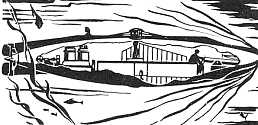|
Encouraged by these results, he gave up his teaching and devoted all of his time to perfecting the submarine. He built ship after ship and in 1898 launched his ninth - the "Holland." It was driven on the surface by a 50 horsepower gasoline engine, and under water by an electric motor and storage batteries. It was very successful and in 1900 he demonstrated it to a Naval Committee off Newport. Admiral Dewey was so enthusiastic that he made the following statement, "If the enemy had had two of those boats at Manila, I could not have held it with my squadron." Holland's contemporary, Simon Lake, wanted to build a submarine to salvage wrecked ships and their valuable cargoes from the bottom of the sea. His first attempt resembled an underwater airship but was not too successful so he built a second - the Argonaut Junior. After the tests, he abandoned the salvage idea and turned his attention to the Naval type of submarine. Among Lake's contributions were the hydroplanes used to maintain a constant depth while submerged. This system is still used on our modern craft.  Japan quickly purchased five Holland submarines in 1900 but Germany did not build one until 1908, using Holland's design and Rudolph Diesel's new engine. However, she quickly took advantage of the new weapon's possibilities as demonstrated by the blockade of Britain in 1917. |








